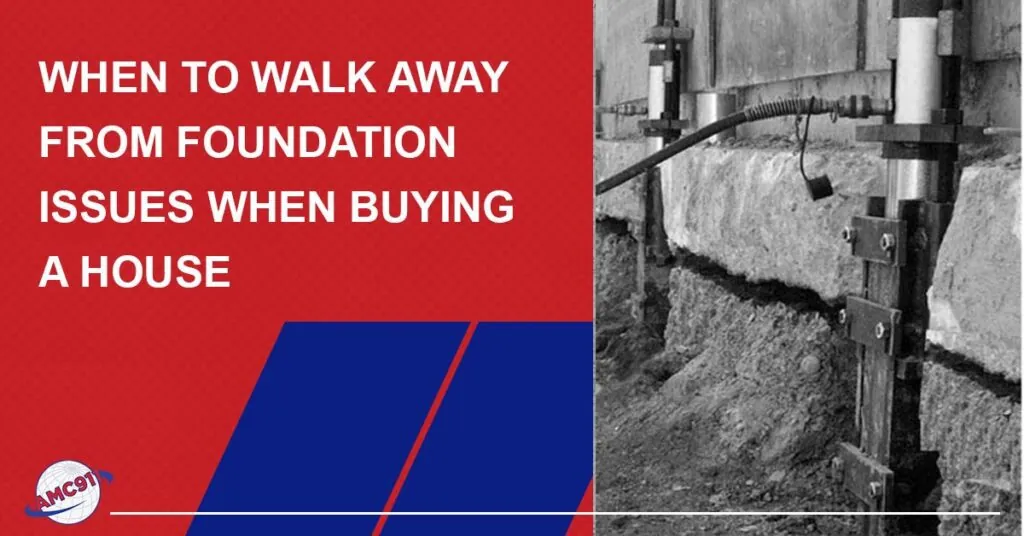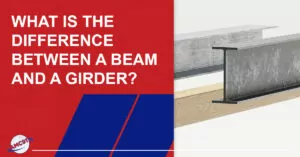Wondering when to walk away from foundation issues when buying a house? If so, you’ve landed on the right page because that’s what we’re going to talk about in this article. We’ll review what foundations are, the most common causes of foundation problems, when you should walk away from foundation issues when buying a house, and much more.
What Is A Foundation?
A foundation is the base upon which the entire house rests. It provides stability and support to the structure. The type of foundation used to build a house depends on various factors, including geographical location, soil composition, personal preference, and budget.
Types Of Foundations
Slab foundations
Concrete slab foundations are commonly used in areas with relatively shallow frost lines. They’re the least expensive option and involve pouring a concrete slab on top of the ground.
Crawl space foundations

A crawl space foundation involves pouring a concrete footing and then framing walls around the perimeter to create a raised platform off the ground. This creates a space beneath the house that can be used for storage or as a utility area. The crawl space can then be insulated and encapsulated for added energy efficiency and to protect the wooden structures in the crawl space from structural damage.
Basement foundations
Full basement foundations are the most expensive option but provide the maximum space, storage, and utility area. They involve digging a hole into the ground and pouring a concrete foundation. The walls are then constructed, and insulation is added to create a dry, usable space.
As noted above, the type of foundation used depends on the house’s location, soil composition, personal preference, and budget.
Foundations must be built correctly
It’s essential to have a solid foundation to ensure the house is structurally sound and safe. Poorly constructed foundations can lead to structural issues and potentially costly repairs in the future.
What Do We Mean When We Say A House Has A Foundation Issue?
When a house has a foundation issue, it means something has gone wrong with its fundamental support system. The foundation is designed to bear the weight of the entire structure, and any problem with the foundation could compromise the home’s structural integrity.
The two most common causes of foundation problems are differential settlement and hydrostatic pressure. Both of these problems can cause severe structural damage to a foundation. We’ll talk more about both in the next section.
The Two Most Common Causes Of Foundation Issues
Various things, including the following, cause foundation issues:
Differential settlement
Differential settlement is when a structure settles into the ground unevenly. This can happen for various reasons, including the soil type, temperature changes, poor drainage, and other natural and man-made causes.
Differential settlement means that one part of the foundation is sinking into the ground more than another. This puts tremendous stress on the foundation and can lead to severe structural damage. Even a small amount of differential settlement can significantly affect a building’s structural integrity.
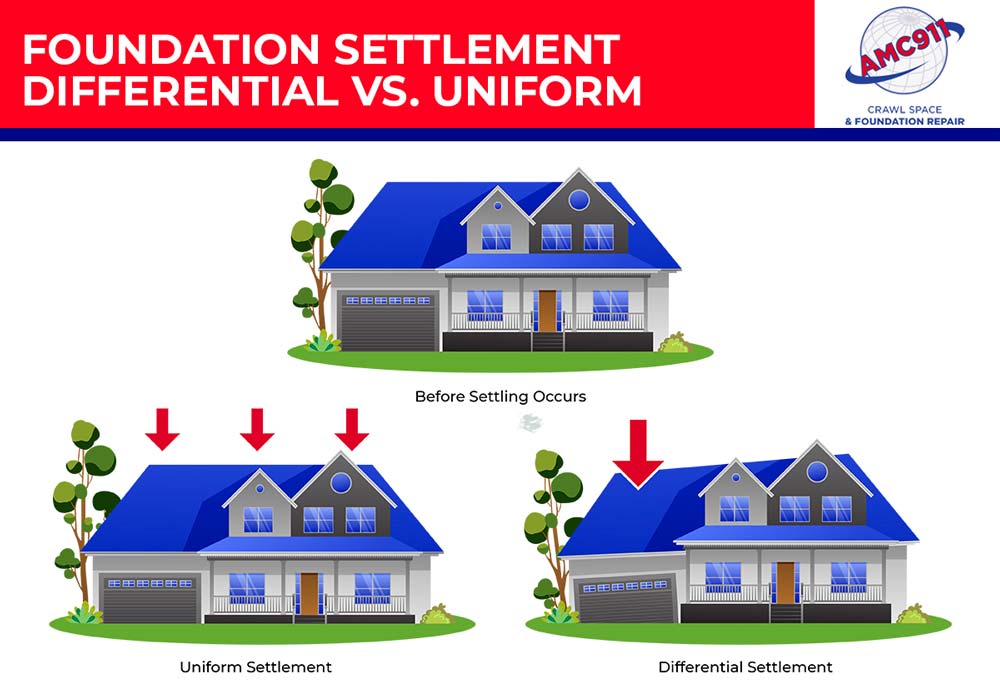
To prevent differential settlement, engineers use various techniques, such as compacting the soil before the foundation is built and using piers to create a deeper foundation that goes down to stable soil.
Causes of differential settlement
One of the leading causes of differential foundation settlement is expansive soil. Expansive soil is a type of soil that expands when it gets wet and contracts when it dries out. This can cause the foundation to move and shift, eventually leading to differential settlement.
Another cause of differential foundation settlement is erosion-prone soil. This soil type is more likely to erode, which can lead to the formation of voids under the foundation. Over time, these voids can cause the foundation to sink and shift.
Trees that are planted too close to the foundation can also cause differential settlement. As the tree’s roots grow, they can push against the foundation, causing it to move and shift.
Heavy excavation too close to the foundation is another cause of differential settlement. When the soil is removed from around the foundation, this can cause it to sink and shift.
Finally, seismic events can also cause differential settlement. Earthquakes and other seismic events can cause the soil to shift and move, leading to the foundation settling unevenly.
Hydrostatic pressure
Another major cause of foundation issues is hydrostatic pressure caused by poor drainage around the foundation. When excess moisture in the soil around the foundation can’t drain off, hydrostatic pressure will build up and exert pressure against the foundation walls. This pressure can be intense, and if it isn’t relieved, it can eventually cause a foundation wall to bow inward and even collapse. Hydrostatic pressure is also strong enough to push water through invisible cracks in the foundation wall and into the basement or crawl space.
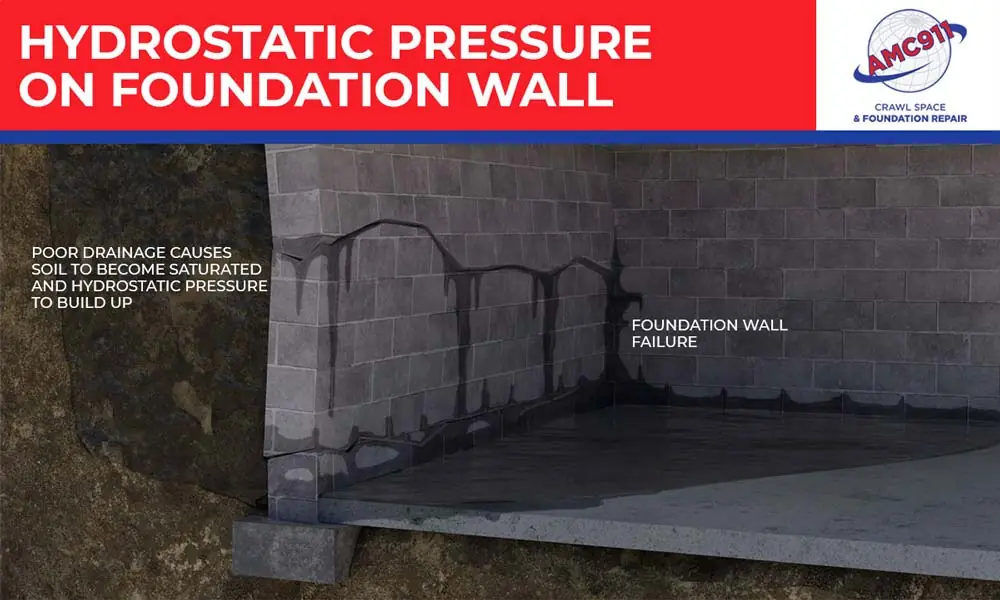
Fortunately, there are ways to prevent differential settlement and hydrostatic pressure from damaging a foundation. We will talk about those in just a bit, so keep reading.
For more information, see Drain Tile 101: What Is Drain Tile & How Does it Work?
Other Causes Of Foundation Issues
Other causes of foundation issues include soil that wasn’t adequately tamped down before construction started. This can cause a structure to settle unevenly into the ground after it’s built.
Additionally, inadequate or improper building techniques can also lead to foundation issues. This can include using poor-quality building materials, hasty or careless construction practices, or insufficient support structures within the foundation itself. In 1972, national building codes for residential construction were implemented by the US government. Prior to that time, home construction was the “wild, wild west”, where anything went. This means any home built before 1972 might not meet current construction code requirements.
One lesser-known cause of foundation problems is the presence of nearby trees. The roots can gradually penetrate and displace soil beneath the foundation, leading to shifting or settling. Moreover, tree roots can also dry out surrounding soil, causing it to shrink, leading to foundation issues.
Common Signs Of A Foundation Problem
Because foundation issues can lead to structural damage and costly repairs, it’s essential to identify them early and address them promptly to prevent them from becoming major problems. Here are some things to look out for:
- Wall, floor, and ceiling cracks
- Doors and windows that stick or won’t close properly
- Uneven floors
- Stair step cracks in brick or masonry
- Bowed and/or cracked basement walls
- Moldings that have pulled away from the wall or ceiling
- Porches and chimneys that have separated from the house
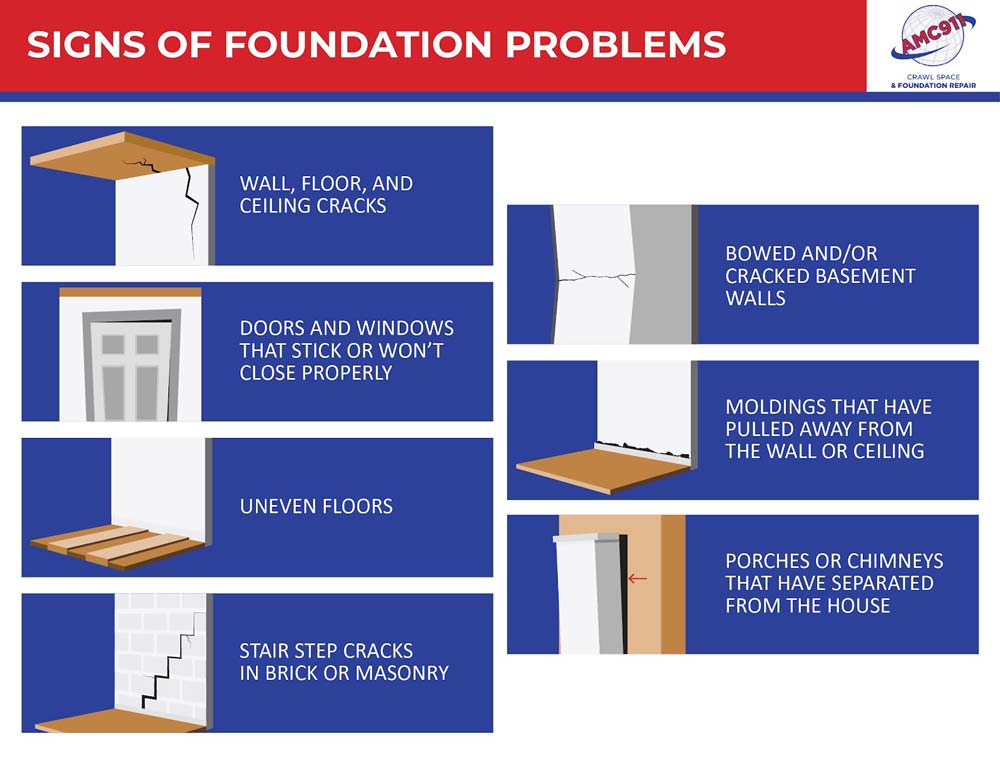
If any of these signs are present – or anything else that seems suspicious – have the foundation inspected by a professional immediately.
The Good News Is Most Foundation Problems Can Be Fixed
The good news is most foundation problems can be fixed. Depending on the severity and nature of the problem, there are a variety of solutions available, including the following:
- Underpinning using piers (push, helical, slab, drilled concrete) can be used to correct differential settlement. For more information, see Foundation Underpinning Methods – Which is Best for My Home?
- Bowed and/or cracked foundation walls can be stabilized using various solutions, including carbon fiber straps, I-beams, and wall plate anchors.
When it comes to foundation repair, it’s essential to work with a qualified and experienced team of professionals. A reputable foundation repair company will have the knowledge, skills, and equipment to accurately diagnose the problem and develop a customized solution that meets your needs and budget.
Whatever you do, don’t delay dealing with a foundation issue. Foundation problems worsen over time; if you wait, you’ll pay more for the repair later. By taking prompt action, you can save money.
Never Buy Without Getting The House Inspected First
Buying a home is one of the most significant investments many will make. However, the excitement of finally finding the perfect house can sometimes make people overlook important details. One crucial aspect that should never be ignored is the house’s foundation and overall structural integrity. Therefore, before making any purchase, you must get the home inspected by either a foundation repair contractor or a structural engineer. Without an inspection, hidden foundation issues may compromise the house’s safety and stability. While sellers are required to disclose any foundation issues to potential buyers, there’s no guarantee they will.
Sometimes, It’s Ok To Buy A House With A Foundation Issue
When buying a house, an existing foundation problem shouldn’t necessarily be a deal breaker. The vast majority of foundation problems can be repaired, either through minor fixes or more extensive renovations. However, when buying a house with a foundation problem, you must arm yourself with as much information as possible. This means getting a thorough inspection from a qualified professional and taking the time to do your due diligence on the property and its history. If the foundation has a problem, you can figure the cost of the repair into your offer.
When You Should Walk Away From A House With A Foundation Issue
If you’re considering buying a house, it’s crucial to have a thorough inspection done. This should include examining the foundation for any signs of damage or instability. If the inspector does find issues with the foundation, it doesn’t necessarily mean you have to walk away from the deal. You can always figure the cost of the repair into your offer. However, there are situations where it’s wise to cut your losses and move on:
- If the foundation damage is extensive, will cost a lot of money to fix, and the seller is unwilling to lower the price because of it, walk away.
- Another factor to consider is whether you can reasonably afford the repairs. Fixing foundation issues can be expensive, and they’re often not covered by homeowners’ insurance. If the cost of the repairs is more than you’re willing or able to pay, then it’s best to cut your losses and walk away.
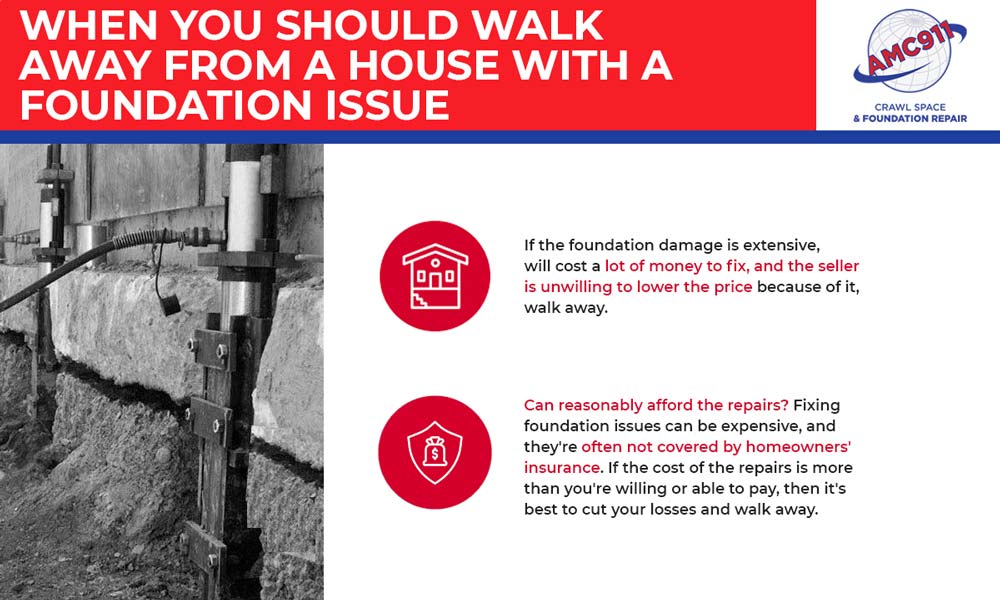
How Much Does It Cost To Fix A Foundation Problem?
The cost of foundation repair can vary greatly depending on several factors, including your geographical area, the type of foundation, the type and severity of the damage, ease of access, and the chosen repair solution. Minor repairs may cost anywhere from a few hundred to a few thousand dollars, while major repairs can cost tens of thousands of dollars. Consult a professional foundation repair company for an accurate cost estimate for your specific situation.
If you’re considering buying a home and want to have it inspected by a professional before signing anything, contact AMC911 today to schedule a foundation evaluation. If we find a problem, we’ll give you a repair estimate that you can figure into your offer.

